

New York startup wants to be your ‘AAA for healthcare’ When Alan Blaustein, a New York media executive and attorney, was diagnosed with thymic cancer seven years ago, he was thrown into a confusing world of disagreeing doctors who didn’t talk to one another and insurance companies that had never heard of his type of cancer.
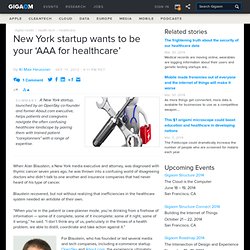
Blaustein recovered, but not without realizing that inefficiencies in the healthcare system needed an antidote of their own. Physicians May Not Be Social, But They are Interactive. Are Your Aging Parents Taking Too Many Pills? It’s a dangerous situation.
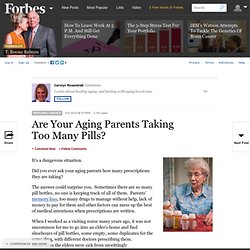
Did you ever ask your aging parents how many prescriptions they are taking? The answer could surprise you. Sometimes there are so many pill bottles, no one is keeping track of all of them. Parents’ memory loss, too many drugs to manage without help, lack of money to pay for them and other factors can mess up the best of medical intentions when prescriptions are written. When I worked as a visiting nurse many years ago, it was not uncommon for me to go into an elder’s home and find shoeboxes of pill bottles, some empty, some duplicates for the same drug, with different doctors prescribing them. Doctors are often in a hurry and seniors may be too intimidated to insist that their list of medications be reviewed at the medical appointment.
What’s the answer to this? An underutilized resource is the neighborhood pharmacist. “The pharmacist can be the patient’s advocate with the MD” says Susan Gordon, licensed Pharmacist for 15 years with CVS in Tampa, Florida. Simplee Raises $6 Million Series A For Its Mint-Like Approach To Tracking Healthcare Expenses. Simplee, a Mint-like platform for tracking healthcare expenses and then paying them online, is today announcing the close of its $6 million Series A round of funding.
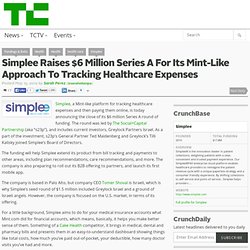
The round was led by The Social+Capital Partnership (aka “s23p”), and includes current investors, Greylock Partners Israel. As a part of the investment, s23p’s General Partner Ted Maidenberg and Greylock’s Tilli Kalisky joined Simplee’s Board of Directors. The funding will help Simplee extend its product from bill tracking and payments to other areas, including plan recommendations, care recommendations, and more. The company is also preparing to roll out its B2B offering to partners, and launch its first mobile app. The company is based in Palo Alto, but company CEO Tomer Shoval is Israeli, which is why Simplee’s seed round of $1.5 million included Greylock Israel and a ground of Israeli angels. One-third of Americans using social media to share health information, survey finds. Do We Need Doctors Or Algorithms? Editor’s note: This is Part II of a guest series written by legendary Silicon Valley investor Vinod Khosla, the founder of Khosla Ventures.
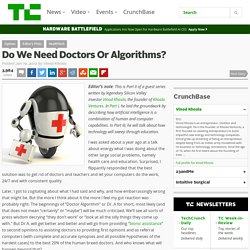
In Part I, he laid the groundwork by describing how artificial intelligence is a combination of human and computer capabilities. In Part III, he will talk about how technology will sweep through education. I was asked about a year ago at a talk about energy what I was doing about the other large social problems, namely health care and education. Surprised, I flippantly responded that the best solution was to get rid of doctors and teachers and let your computers do the work, 24/7 and with consistent quality. Later, I got to cogitating about what I had said and why, and how embarrassingly wrong that might be. Assessing Current Healthcare. Games That Solve Real Problems: Crowdsourcing Biochemistry. Can you crowdsource health information via Twitter? The Internet is one of the first places many people go to research symptoms or illnesses they have (or think they might have), and social networks like Twitter have also become a hotbed of symptom-sharing and health advice.
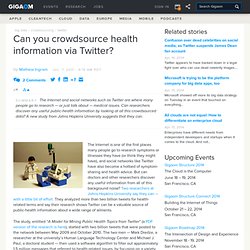
But can doctors and other researchers discover any useful information from all of this background noise? Two researchers at Johns Hopkins University say they can — with a little bit of effort. They analyzed more than two billion tweets for health-related terms and say their research shows Twitter can be a valuable source of public-health information about a wide range of ailments.
The study, entitled “A Model for Mining Public Health Topics from Twitter” (a PDF version of the research is here), started with two billion tweets that were posted to the network between May 2009 and October 2010. The two men — Mark Dredze, a researcher at the university’s Human Language Technology Center and Michael J.
Facebook Timeline Ads Show Your Clean vs. Drug-Addicted Life. In a creative social media campaign, media agency McCann Digital Israel has used the new Facebook Timeline design to advertise for the Israel Anti-Drug Authority.
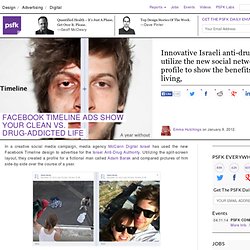
Utilizing the split-screen layout, they created a profile for a fictional man called Adam Barak and compared pictures of him side-by-side over the course of a year. On the left, the photos show a year of his life as a drug addict, whereas on the right they show a year without drugs. The comparative photos of Adam display stark contrasts in his appearance and surroundings, with the drug-free Adam looking happy and successful, while the addicted Adam seems to have lost his girlfriend, job and home.